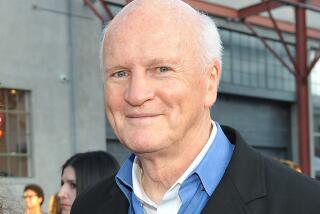Gallery Owners Win Ruling in Kinkade Case
- Share via
An arbitration panel on Thursday awarded $860,000 to two former Thomas Kinkade Signature Gallery owners who accused the self-proclaimed “Painter of Light” and his company, Media Arts Group Inc., of fraudulently inducing them to invest in the business -- and then ruining them financially.
While not singling out Kinkade in its finding of fraud, the panel ruled that the Morgan Hill, Calif.-based company and one of its executives, Richard F. Barnett, “failed to disclose material information” that would have dissuaded Karen Hazlewood and Jeffrey Spinello from investing $122,000 to open the first of their two Virginia galleries in 1999.
The arbitrators, in a 2-to-1 ruling, also found that Kinkade and other company officials used the artist’s familiar Christian-oriented themes to create “a certain religious environment designed to instill a special relationship of trust” with the couple, who have since divorced.
“Media Arts through its agents Thomas Kinkade, Ken Raasch and Barnett, in particular, held itself out to be acting on a higher plain,” the panel said in its written opinion, adding that the men frequently used terms such as “partner,” “trust,” “Christian” and “God” to convey a sense of “higher calling” to Hazlewood and Spinello.
The panel’s decision marks the first major loss for Kinkade and Media Arts Group in litigation brought by former dealers. The artist and the company he took private two years ago have prevailed in at least three previous arbitration claims.
The panel’s interim award, issued Thursday, does not include interest, costs and attorney fees that have yet to be calculated and could bring the total to $3.5 million, said Norman Yatooma, the couple’s Birmingham, Mich., lawyer, whose firm has five other cases pending, all with similar allegations.
“Being the first case to defeat Kinkade, I think, will open the floodgates,” Yatooma said. “It will give Jeff and Karen a new future and the rest of our clients hope.”
Dana Levitt, attorney for Kinkade, Barnett and Media Arts Group, said he shared the dissenting panel member’s view that the other two arbitrators made “numerous substantial errors” in their finding. He said he would seek “appropriate legal remedies” to void the ruling before it becomes final.
“I think the evidence is very strong that my clients did what they were required to do,” Levitt said. “The plaintiffs knew what they were getting into. It was a business investment that had certain risks and it didn’t work out for them. And now they want my clients to pay the price for mistakes they made.”
Kinkade and Barnett could not be reached for comment.
Before Hazlewood and Spinello became disenchanted dealers of Kinkade’s artwork, they were admirers and collectors. They owned more than a dozen of the artist’s luminescent, limited-edition prints by the time they moved to Virginia in 1999 to open their first gallery.
But instead of helping them succeed, they alleged, Kinkade and the company he built on the themes of faith and family values drove them out of business.
They and other ex-dealers allege that Kinkade used his religious beliefs -- and manipulated theirs -- to induce them to invest in Thomas Kinkade Signature Galleries, independently owned stores licensed to deal exclusively in his work. They also allege that they were stuck with unsalable inventory, forced to open additional stores in markets that could not sustain them and undercut by discounters that sold Kinkade prints at prices they were forbidden to match. And they accuse the artist of scheming to devalue Media Arts Group before he took the company private for $32.7 million in early 2004, renaming it Thomas Kinkade Co.
Kinkade has denied the allegations.
Levitt, his lawyer, told the arbitration panel in December 2004 that the failure of the Hazlewood-Spinello galleries was part of a broad decline in the limited-edition art business, hastened by the dot-com crash, a shrinking economy and the Sept. 11 attacks. By the time they went out of business, he said, the couple owed the company $27,000 for inventory and had no one to blame but themselves.
“If they had made better business judgments, if they had capitalized on the opportunity to make greater profit, if they had kept their marriage together, perhaps they could have survived,” Levitt told the arbitration panel. “But they didn’t, and there was no room for error.”
In testimony in the arbitration case and in an interview with the Los Angeles Times, Spinello, 38, described his business dealings with Kinkade as devastating, financially and emotionally.
Like legions of Kinkade collectors, he and Hazlewood ignored critics’ dismissals of the artist’s work as overly sentimental. They bought their first print, “New Day Dawning,” in 1996 and say they were drawn not only to his warmly glowing images of cottages and lighthouses, seascapes and street scenes, but to his wholesome values.
“I liked Thom because I liked what he stood for,” Hazlewood told the arbitration panel in April. “He had similar values that I felt that I had.... And when I looked at his paintings and listening to his background I could feel that, and so it made me feel better about his paintings.”
Before going into the art business, Spinello testified, he owned video arcades in the Bay Area. Hazlewood said she worked as an executive administrative assistant for several companies.
Months after meeting the artist at a “Celebration of Light” event in Carmel in 1998, the couple enrolled in Thomas Kinkade University, a weeklong, $750 training for prospective gallery owners.
“We were told success story after success story, and of course the ‘Thom story’ and his Christian views and the way he runs his life,” Spinello told the panel in late 2004. “And it just made you ... want to jump on board and be a part of it.”
Spinello said in an interview that much of the “spiel” by Barnett and others at “TKU” revolved around the Painter of Light.
“The story we got is: Here is a guy who comes from a broken home and worked his way up from nothing,” Spinello said. “Basically, it was the rags-to-riches story, and God was a major part of it.”
Nothing was said about the risky nature of the art business, Hazlewood and Spinello testified, nor were they told that Signature dealers were already foundering in significant numbers. Instead, they said, they were led to believe that their business would flourish if they “followed the recipe” spelled out by Media Arts Group.
They opened their first Signature gallery in Charlottesville, Va., in May 1999. It was hardly off the ground, they contend, when the company started pushing them to establish another outlet in the same sales territory or risk having Media Arts Group put one of its own stores there. In late 2000 they unveiled a second gallery in Fredericksburg, -- about 70 miles away.
Working six or seven days a week, they testified, they earned no more than $60,000 a year in combined salary.
As they and other Signature gallery owners struggled to stay afloat, those at the top of Media Arts Group raked in huge incomes, according to testimony. Kinkade made $53 million in royalties from 1997 through May 2005. Barnett, as head of retail sales, averaged more than $2 million a year from 1999 to 2001 in commissions on sales to dealers.
In what the ex-dealers describe as a scheme to “stuff” their inventory channels to fatten Media Arts Group’s coffers, they allege the company required them to buy two or three copies of each new edition of Kinkade’s high-end canvas reproductions, some of which cost thousands of dollars but proved to be slow-selling “dogs.” Spinello said they were not allowed to discount the pieces and could return them only if they bought two or three new prints for each one sent back.
“It was shoving inventory down our throats,” Spinello testified. “All our money is tied up in this garbage, and we would have to buy 90 to get rid of 30.”
The fatal blow, according to the arbitration claim, was what became known as the “Tuesday Morning sale.”
Although Signature gallery dealers were strictly bound by Media Arts Group’s pricing policies, the company sold some Kinkade paper prints to a clearinghouse that resold them to a company that framed them. In December 2001, the prints wound up in Tuesday Morning stores, a discounter that priced them far below what Signature dealers were required to charge.
Company officials testified that the sale was necessary to keep Media Arts afloat in a post-Sept. 11 slump and disputed the contention that the sale of paper prints seriously affected the Signature galleries, which dealt chiefly in the more expensive canvas reproductions.
However, Spinello testified that his customers went “ballistic” over the sale. Having previously been assured that Kinkade’s art was never sold at a discount, and thus would hold its value, they felt betrayed and demanded refunds.
“The fallout was enormous,” Spinello said. “It was the kiss of death.”
He and Hazlewood closed their Fredericksburg gallery in March 2003 and shuttered their Charlottesville store eight months later. Now selling real estate for a living, Spinello said he and Hazlewood are deeply in debt.
“The sad part is I believed him, and I got a lot of people to buy his products and his paintings,” he said. “Those people must feel about me the way I feel about Thomas Kinkade -- and that’s sad.”
More to Read
The biggest entertainment stories
Get our big stories about Hollywood, film, television, music, arts, culture and more right in your inbox as soon as they publish.
You may occasionally receive promotional content from the Los Angeles Times.











